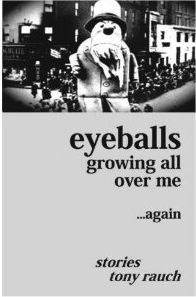
|
WHISTLING SHADE |

Eyeballs Growing All Over Me ...Again
Tony Rauch
(Eraserhead Press)

When last we left Tony Rauch, in Laredo (2008), the master of bizarro fiction was rowing through clouds in a canoe, and the president was shrinking. His new story collection, Eyeballs Growing All Over Me ...Again, reads almost like a sequel to Laredo—the same publisher and cover art design, the same quirky titles and section headings, the same inexplicable use of Biblical epigrams (none of the stories are in the least related to Christianity). And the same descent of strangeness upon a commonplace world—though the strangeness in Eyeballs has shifted slightly, in the direction of aliens and mad science experiments.
If clips of dozens of science fiction B films were spliced together, the effect might be somewhat similar to reading Eyeballs Growing All Over Me ...Again. The stories are, more often than not, just the opening scene of a larger tale that Rauch never concludes (considerately leaving that work to us, the reader). A couple wakes up in bed to find that their roof is gone and a giant robot is staring at them from above (“Gigantic”). A boy sees his sister come home from the hospital after an operation—she now sports a goat’s head (“The Procedure”). A man desperate to win his ex-girlfriend back goes through a time portal to an alternate world where she may be more interested in him (“Send Kurpac through the portal”). Most of the pieces begin with an unassuming, everyman narrator who quietly reports something very weird happening in his ordinary world. From “People have been drifting away lately”:
People have been drifting away lately. Just out of the blue, here and there someone will lift off the ground and float off, slowly turning away into the sky. Just like that. I haven’t seen it for myself, I only heard of it, and I guess at the time I just dismissed it as a rumor or someone else’s problem or something. I guess I was busy with my own thing—too busy painting my garage—scraping off the old and putting on the new, too bogged down with the dishes and laundry to really think much about it.
Against the drab background and self-absorption of Rauch’s narrators (mainly lonely bachelors, though sometimes boys), the strange events come as a welcome relief. There is a deadpan, Far Side sort of humor to be found in the stories, as when the narrator is woken in the middle of the night to find hundreds of miniature elephants, the size of small dogs, running down his hall.
While Eyeballs is not a major departure, these twenty-three stories are unmistakably, indefinably Tony Rauch. The collection delivers some much needed insanity, leavened with just a touch of wistfulness.
- Joel Van Valin
Rodney Nelson writes that his latest chapbook, In Wait (Night Bomb Press), “arrived without invitation during a difficult time.” His sister and brother-in-law, who had lived at the family farmstead in North Dakota, recently died within a few months of one another. These elegiac poems recall them, sometimes specifically, and at other times in the tone of reflective melancholy, as in “Vacant Farmstead in Winter”:
the cat went too
so nestlings will get to fly in May
and the May will be
field mice teeming
the unmown yard grass overtaking
and then an autumn of pugmarked dirt
of yellow and madder in the grove
Nelson’s lyrical voice—sometimes expanding out like a vision of the plains, at other times climbing narrow branches of enjambment—reminds me of Dylan Thomas, a Dylan Thomas transplanted to the prairies of North Dakota. His best pieces feel as though they were written in a strange, magical language, that can only be roughly translated to English:
the lake was day between the trees out there
with a boat and no wind to ripple it
and the evening came to a matter
of windlessness too and the lake to moon
(“September Fulling”)
Ithaca poet Laura Glenn speaks plainly, but what she chooses to speak about is often curious in its own right. The poems in her collection I Can’t Say I’m Lost (FootHills Publishing) contain observations on sleeping ducks, pottery, taking the subway to work, Petrarch and Laura, and how she dressed up for Halloween as Keats’s “To Autumn”. At 91 pages, I Can’t Say I’m Lost is long for a chapbook, and some of the more mundane poems could probably have been weeded out. Just when you think Glenn has become predictable, though, an odd metaphor or keen observation will jump out at you, as in the short poem “Merging”:
You ride your bicycle over a field.
You’re an antelope—your handlebar antlers
butt the air you breeze through over the lion-
colored grass. You track the land like an animal:
you’re the last and first of your tribe.
For those in the mood for light verse we heartily recommend Sugartown by Kevin Zepper (Finishing Line Press). No one else has probably ever written (or even thought of writing) a poem about Pez dispensers. Other titles (“Potato Salad!”, “Oscar Wilde’s Lips”, “Ode to an ‘86 Olds”) indicate the level of absurdity Sugartown aspires to, but there are some more serious and romantic entries as well, such as a tribute to Johnny Cash and and a wonderful poem entitled “Rose Girl”:
Clearing fifty a night,
triple on Valentine’s,
she slowly circles the bar twice,
moving on to the next tavern
on her list of six.
Rose Girl knows
every bar everywhere is
starving for flowers